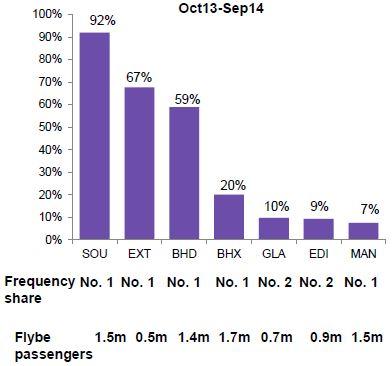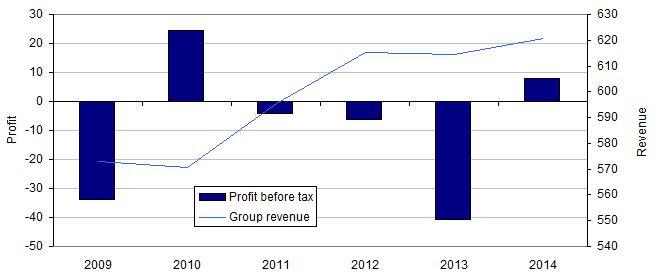Introduction
In the modern society, the environment of business operation is characterised by stiff competition. As a result, transforming business performance has become an integral part of gaining the competitive edge for many organisations (Hughes 2010). According to Carnall (2007), organisations devise innovative strategies in order to differentiate their business processes from those of competitors. The external environmental factors that affect the businesses make it difficult for organisations to forecast ahead. Hughes (2010) noted that systematic approach plays a critical role in transforming the business performance in the unpredicted business environment. The following is an analysis of Flybe Airline.
Flybe Airline
Flybe is a leading regional airline in United Kingdom. The pricing of its services and products makes the Airline a low-cost carrier. The airline has a lot of business strength in the regional market of UK. According to Centre for Aviation (2015), Flybe has the largest fleet compared to the other regional operators in Europe. In 2014, Flybe was rated as the largest airline in terms of passenger numbers at Birmingham, Manchester, Southampton, Belfast and Exeter. The airline was ranked second in Glasgow and Edinburg (Centre for Aviation 2015). Table1shows the Flybe’s share of passengers in the regional airports between October 2013 and September 2014 (Centre for Aviation 2015).

Analysis of Requirements and Reasons for Transformational Change
According to Hanlon (2007), market forces determine the success of an organisation and its ability to stay relevant. The competition faced by organisations and the forces of demand dictate the need for fundamental change. The transformational change is based on the critical theory that ignites the wake-up call for re-emergence. In a typical business, the growth curve involves growth, success plateau and finally decline. The decline may lead to the death of an organisation.
However, Anderson and Ackerman (2001) noted that proper analysis of the organisation and initiation of strategies that reverb the firm can lead to sustainable growth. Transforming the business performance depends on commencement of a change process to forge forward based on clear set goals and vision. Atchison and Bujak (2001) noted that transforming the performance of business must be based on an effective change strategy. For example, change of leaders and employees’ mindset and implementation of a design that acts as the path for the transformational change process.
Flybe enjoys a substantial market share in the region. The strong market presence is attributable to the low-cost charges; hence, the high customer numbers in some airports. Despite the strong market position, Flybe Airline profitability has not been consistent. Table 2 illustrates the profits and revenues for Flybe since 2009 to 2014 (Centre for Aviation 2015).

In addition, the airline’s passenger load factor is low compared to the other airlines in the region. According to Centre for Aviation (2015), the airline loses customers due to smaller average length of flight compared to the competitors. The company also faces a threat from the railway transportation, road transport, and the economic fluctuations that affect aviation industry. The inconsistent profits, fluctuations in the revenue and the increasing competition from the regional airlines and other modes of transport point to a business gap. Therefore, the gaps point to the need for transformational change.
Recommendations
The increased competition and reduced customer load points that Flybe Airline is on the declining path. For the airline to improve the performance and stay relevant, transformations are inevitable. Therefore, the following strategies, concepts and models are critical for the airline.
Strategies
Flybe operates at efficient cost base compared to the other regional airlines. However, from the figures obtained between 2009 and 2014, it is clear that the airline has not established sustainable levels of profits. In order to transform performance, the management of Flybe should put in place strategies to streamline the operations. The management should device both the functional level and organisational control strategies. According to Miller (2012), the functional level strategies are measures taken by business to improve the operation activities. For instance, Flybe has been experiencing customer losses due to the smaller average length of flight compared to the competitors. Therefore, to align itself, the company needs to introduce a package to cater for the category of the passengers.
On the other hand, the organisational control strategies entail internal measures that ensure that an organisation improves the experience of the customers (Miller 2012). Flybe should invest in new technologies that are efficient and that guarantee quality for the customers. Technology should be used as a cost effective measure for the airline in reaching its potential customers. The company should also initiate corporate social responsibility (CSR) strategies in order to enhance its brand and corporate image. The company should device CSR activities that ensure that it asserts its role as a regionally responsible player in the field of aviation. Another strategy to retain its customer base is to initiate a loyalty programme such as mileage compensation plan to attract the customers. The strategies should be approached in a manner that does not overstretch the operational cost of the airline.
Concepts and Models
The organisational structure of an organisation determines the level of innovations and creativity that exists in an organisation. Flybe should put in place a business model that integrates the core areas of the airline operation in order to stir growth and profitability (O’Brien 2001). The airline should adopt Transformative Change Model (TCM). The model is based on leadership concepts that frame vision and strategy for an organisation. The TCM is based on a holistic approach to addressing the management issues (Kelley, 2008). It accentuates the culture of forging towards positives and in a collaborative manner.
De Bono (2009) stated that the concept of the change should be based on integrated management process that includes the adoption of the culture of efficiency. Thus, Flybe should engage the employees in all the core aspects that are aimed at satisfying customer. It should also rebrand its packages in order to retain the high customer base. The concept behind the TCM is the application of innovative strategies, transformative leadership that upholds employee motivation, and application of new technologies and loyalty programmes for customers (Kuratko, Hornsby & Goldby, 2012).
Change Management Principles
The change management principles that Flybe should incorporate include an organisational culture of ownership, communication and team building process. The principles are to create a sense of belonging among the employees. According to Van Leeuwen and Terhurne (2010), management principles should be goal oriented. For example, Flybe Airline needs to invest in regular training and advancement of its already existing employees in order to align with new industry requirements and technological developments.
To conclude, competition is very stiff in the regional airline industry. The competition has seen low-cost carriers such as Flybe struggle with maintaining a profitable trend. To stay afloat amidst the challenges, Flybe should invest in technology, motivated employees and strategic marketing. The strategies will lead to a transformational change and increase the performance of the airline.
References
Anderson, D. and Ackerman, L. 2001. Beyond change management, Jossey Bass/Pfeiffer, San Francisco. Web.
Atchison, T. and Bujak, J. 2001. Leading transformational change, Health Administration Press, Chicago. Web.
Carnall, C. A. 2007. Managing change in organizations, Prentice Hall, Harlow Financial Times. Web.
Centre for Aviation. 2015. Flybe as an airline does not necessarily convert to sustainable profits, Centre for Aviation, London. Web.
De Bono, E. 2009. Lateral thinking: a textbook of creativity, Penguin, London. Web.
Hanlon, J. P. 2007. Global airlines: competition in the transnational industry, John Wiley publishers, New York. Web.
Hughes, M. 2010. Managing change: a critical perspective, CIPD, London. Web.
Kelley, T. 2008. The ten faces of innovation: strategies for heightening creativity, Profile Books, London. Web.
Kuratko, D, Hornsby, J. Goldby, M. 2012. Innovation acceleration: transforming organisational thinking, Prentice Hall, Harlow. Web.
Miller, D. 2015. Delivering Transformational Change. The European Business Review, vol. 1, no.1, pp.102-123. Web.
O’Brien, D. 2001. Integrating Corporate Social Responsibility with Competitive, SAGE, Los Angeles. Web.
Van Leeuwen, M., and Terhurne, H. 2010. Innovation by creativity, Academy Press, Penryyn. Web.